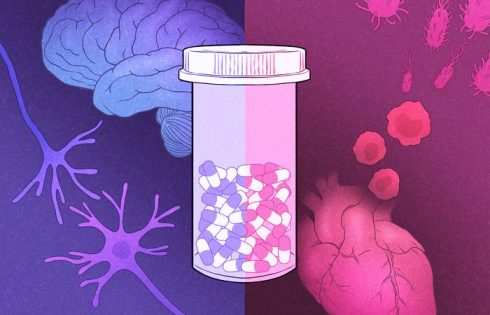
Selective serotonin reuptake inhibitor (SSRI) antidepressants are some of the most widely prescribed drugs in the world, and new research suggests they could also protect against serious infections and life-threatening sepsis. Scientists at the Salk Institute studying a mouse model of sepsis uncovered how the SSRI fluoxetine can regulate the immune system and defend against infectious disease, and found that this protection is independent to peripheral serotonin. The findings could encourage additional research into the potential therapeutic uses of SSRIs during infection.
“When treating an infection, the optimal treatment strategy would be one that kills the bacteria or virus while also protecting our tissues and organs,” commented professor Janelle Ayres, PhD, holder of the Salk Institute Legacy Chair and Howard Hughes Medical Institute Investigator. “Most medications we have in our toolbox kill pathogens, but we were thrilled to find that fluoxetine can protect tissues and organs, too. It’s essentially playing offense and defense, which is ideal, and especially exciting to see in a drug that we already know is safe to use in humans.”
Ayres is senior author of the team’s report in Science Advances. In their paper, titled “Fluoxetine promotes IL-10–dependent metabolic defenses to protect from sepsis-induced lethality,” the investigators stated, “Our work reveals a beneficial ‘off-target’ effect of fluoxetine, and reveals a protective immunometabolic defense mechanism with therapeutic potential.”
Selective serotonin reuptake inhibitor antidepressants are prescribed for their ability to increase serotonergic signaling in the brain, but they are also known to have a broad range of effects beyond the brain, including immune and metabolic effects, the authors wrote. “It is now recognized that SSRIs also have a wide range of peripheral effects including regulation of immune and metabolic processes.”
Prior research has also found that users of SSRIs such as fluoxetine had less severe COVID-19 infections and were less likely to develop long COVID. Another study found that fluoxetine was effective in protecting mice against sepsis, a life-threatening condition in which the body’s immune system overreacts to an infection and can cause multi-organ failure or even death.
“… SSRIs have been shown to protect against sepsis in animal models and improve outcomes in patients infected with severe acute respiratory syndrome coronavirus 2,” the investigators stated. However, they pointed out that the mechanisms underlying these protective effects have remained unclear.
While our immune systems do their best to protect us against infections, sometimes they can overreact. In sepsis, the inflammatory response spins so out of control that it starts damaging a person’s own tissues and organs to the point of failure. “Sepsis is defined as a life-threatening organ dysfunction caused by a dysregulated host response to infection,” the authors further commented. “Sepsis is largely driven by an overexuberant inflammatory response to an infection.” This same overreaction is also characteristic of severe COVID-19 illness.
One solution might be to suppress the inflammatory response, but doing so can actually make patients more vulnerable to their initial infection and more susceptible to new infections. Timing is also critical, as immunosuppressive drugs need to be administered before any tissue damage has taken place. And while numerous clinical trials have been performed with neutralizing antibodies that target pro-inflammatory cytokines, the team pointed out, “… these approaches have been met with little success.”
Instead, an ideal treatment would proactively control the intensity and duration of the immune response to prevent any bodily damage and also kill the infection that puts the body at risk to begin with. “Host-directed therapeutics that can control the degree and duration of an immune response to allow pathogen killing but prevent the escalation of the response to a cytokine storm and that also promote metabolic adaptation to the infected state may offer more therapeutic benefit than strategies that focus only on blocking the pro-inflammatory response,” they suggested.
To understand what SSRIs might be doing in this context, Ayres and colleagues studied mice with bacterial infections and separated them into two groups, one pretreated with fluoxetine and the other not given fluoxetine pretreatment. The results demonstrated that mice pretreated with fluoxetine were protected from sepsis, multi-organ damage, and death.
To better understand the findings the team carried out a number of investigations. They first measured the number of bacteria in each mouse population eight hours after infection. They found that mice treated with fluoxetine had fewer bacteria at this stage, signifying a less severe infection, and indicating that fluoxetine had antimicrobial properties that allowed it to limit bacterial growth.
Next, the researchers measured the levels of different inflammatory molecules in each group. They saw more anti-inflammatory IL-10 in their pretreated populations and deduced that IL-10 prevented sepsis-induced hypertriglyceridemia—a condition in which the blood contains too many fatty triglycerides. This enabled the heart to maintain the proper metabolic state, protecting the mice from infection-induced morbidity and mortality.
The team also decoupled this IL-10-dependent protection from multi-organ damage and death from their earlier discovery of fluoxetine’s antimicrobial effects, in turn revealing the drug’s dual-purpose potential to kill pathogens and alleviate infection-induced damage to the body.
To understand how fluoxetine’s influence on serotonin levels might be contributing to these effects, the researchers also looked at two new mouse populations. Both were pretreated with fluoxetine, but one had circulating serotonin, while the other did not. Circulating serotonin is a chemical messenger that travels the brain and body, and is involved in regulating mood, sleep, and pain. Ayres and colleagues found that fluoxetine’s positive health outcomes were entirely unrelated to circulating serotonin. Regardless of whether the mice had serotonin in circulation, they experienced the same infection defense benefits from fluoxetine. “We found that fluoxetine pretreatment promotes both resistance and cooperative defenses in a peripheral serotonin-independent manner,” they wrote.
“That was really unexpected, but also really exciting,” commented study first author Robert Gallant, PhD, a former graduate student researcher in Ayres’ lab. “Knowing fluoxetine can regulate the immune response, protect the body from infection, and have an antimicrobial effect—all entirely independent from circulating serotonin—is a huge step toward developing new solutions for life-threatening infections and illnesses. It also really goes to show how much more there is to learn about SSRIs.”
Ayres and Gallant say their next step is to explore fluoxetine dosing regimens appropriate for septic individuals. They’re also eager to see whether other SSRIs can have the same effects.
“Fluoxetine, one of the most prescribed drugs in the United States, is promoting cooperation between host and pathogen to defend against infection-induced disease and mortality,” said Ayres, who is also the head of Molecular and Systems Physiology Laboratories at Salk. “Finding dual protective and defensive effects in a repurposed drug is really exciting.”
In conclusion, the authors wrote, “Our study mechanistically links the anti-inflammatory and metabolic effects of an SSRI and demonstrates that fluoxetine can be used as a prophylactic to protect from sepsis-induced lethality by orchestrating protective immunometabolic mechanisms, which may be leveraged and further explored by future studies.”

